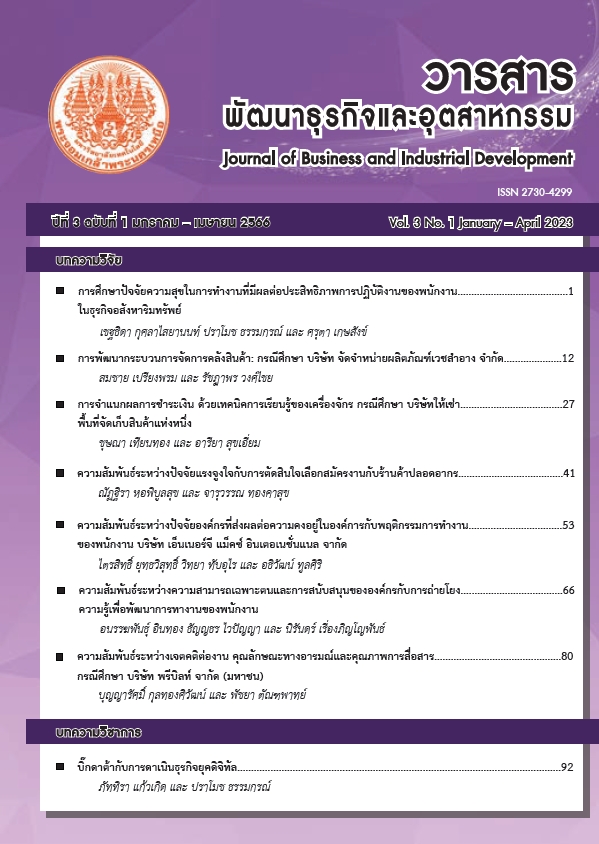ความสัมพันธ์ระหว่างความสามารถเฉพาะตนและการสนับสนุนขององค์กรกับการถ่ายโยงความรู้เพื่อพัฒนาการทำงานของพนักงาน
คำสำคัญ:
การรับรู้ความสามารถตนเอง, การทำงาน, การสนับสนุนขององค์กร, การถ่ายโยงความรู้บทคัดย่อ
การศึกษาเรื่องความสัมพันธ์ระหว่างความสามารถเฉพาะตนและการสนับสนุนขององค์กรกับการถ่ายโยงความรู้เพื่อพัฒนาการทำงานของพนักงานธนาคาร มีวัตถุประสงค์เพื่อศึกษา 1) ปัจจัยด้านรับรู้ความสามารถในงานของพนักงานการสนับสนุนขององค์กรและการถ่ายโยงความรู้เพื่อการพัฒนาการทำงานของพนักงาน จำแนกตามปัจจัยส่วนบุคคล 2) ความสัมพันธ์ระหว่างปัจจัยด้านรับรู้ความสามารถในงานและการสนับสนุนขององค์กรกับการถ่ายโยงความรู้เพื่อการพัฒนาการทำงานของพนักงาน กลุ่มตัวอย่าง ได้แก่ พนักงาน ธนาคารกรุงไทย สำนักงานใหญ่ เป็นการวิจัยเชิงปริมาณ เครื่องมือในการวิจัยเป็นแบบสอบถาม วิเคราะห์ข้อมูลด้วยค่าสถิติด้วยค่าร้อยละ ค่าเฉลี่ย ค่าเบี่ยงเบนมาตรฐาน ค่า t-test ค่า f-test (One-Way Analysis of Variance) และค่าสัมประสิทธิ์สหสัมพันธ์ของเพียร์สัน ผลการศึกษา พบว่า ในด้านรับรู้ความสามารถในงานในภาพรวมอยู่ในระดับมาก ได้แก่ 1) ความสามารถในการใช้ระบบคอมพิวเตอร์ 2) ความเชื่อมั่นในการแสวงหาความรู้ในองค์กร และ 3) การรับรู้ความสามารถเฉพาะตน ในด้านการสนับสนุนขององค์กรในภาพรวมอยู่ในระดับมาก เรียงตามลำดับ ได้แก่ 1) ด้านความสัมพันธ์ในองค์กร 2) ด้านการจัดการระบบเทคโนโลยีเพื่อการถ่ายโยงความรู้ และ 3) ด้านรูปแบบการส่งเสริมการเรียนรู้ และในด้านการถ่ายโยงความรู้เพื่อพัฒนาการทำงานในภาพรวมอยู่ในระดับมาก 3 ลำดับแรก ได้แก่ 1) ความรู้และข้อมูลในระบบจัดการความรู้ทำให้ได้พัฒนาประสิทธิภาพการทำงานมากยิ่งขึ้น 2) สามารถรับรู้ข่าวสารที่สำคัญเกี่ยวกับองค์กร 3) การใช้งานระบบจัดการความรู้ทำให้สามารถทำงานได้ถูกต้องแม่นยำและรวดเร็วขึ้น ผลการวิเคราะห์ความสัมพันธ์ระหว่างการรับรู้ความสามารถในงาน และการสนับสนุนขององค์กรกับการถ่ายโยงความรู้ เพื่อการพัฒนาการทำงานของพนักงาน พบว่า มีความสัมพันธ์กับการถ่ายโยงความรู้เพื่อการพัฒนาการทำงานของพนักงานอยู่ในระดับปานกลาง และระดับสูงในทิศทางเดียวกัน ตามลำดับ อย่างมีนัยสำคัญทางสถิติที่ระดับ 0.05
เอกสารอ้างอิง
Joshi, K., & Knowledge, S. (2007). Transfer within Information Systems Development Teams: Examining the Role of Knowledge Source Attributes. Decision Support Systems, 43, 322–335.
Haslell, R. E. (2001). Transfer of Learning: Cognition, Instruction and Reasoning. UK.: Academic Press.
Krung Thai Bank. (2014, 11 September). Krung Thai Bank Public Company Limited. www.intranet.ktb (in Thai).
Lmarinen, J., Tuomi, K., & Seiitsamo, J. (2005). New Dimension of Work Ability. International Congress Series, 1280. 3-7.
Bandura, A., Freeman, W.H., Lightsey, R. (1999). A Self-Efficacy: The Exercise of Control. New York: WH. Freeman and Company.
Teerapisakkul, S. (2011). Factors Leading to the Use of Knowledge Management Systems: A Case Study of Software Development Organizations. [Unpublished master’s thesis]. Thammasat University. (in Thai).
Mcshane, S.L., & Von, G. Marry MA. (2003). Organization Behavior: Emerging Realities for the Workplace Revolution (2nd ed.). McGraw-Hill Inc.
Berry, J.M. (1987). A Self-Efficacy Model of Memory Performance. American Psychological Association Meetings. New York.
Iamsupasit, S. (2007). Behavior Modification Theory and Techniques (10th ed.). Bangkok: Chulalongkorn University. (in Thai).
Perkins, D.N., & Solomon, G. (1988). Teaching for Transfer. Educational Leadership.
Haslell, Robert E. (2001). Transfer of learning: Cognition, instruction and Reasoning. UK: Academic Press.
Pengthieng, W. (2010). Factors Affecting Knowledge Management Process of Master’s Degree Students, Special Program, Faculty of Management Science. [Unpublished master’s thesis]. Naresuan University. (in Thai).
Duangchampa, W. (2011). Factors of Participatory Management Affecting Knowledge Management in Private Educational Institutions in Chachoengsao. [Unpublished master’s thesis]. Rajabhat Rajanagarindra University. (in Thai).
Royal Academy. (1987). Royal Institute Dictionary 1982. (7thed.). Bangkok: Royal Institute. (in Thai).
Thaposot, S. (2013). Perceived Organizational Support Affecting Job Performance of Employees in Banking Business. [Unpublished master’s thesis]. Rajamangala University of Technology Thanyaburi. (in Thai)
Tierney, P., & Farmer S.M. (2002). Creative Self-Efficacy: Its Potential Antecedents and Relationship to Creative Performance. The Academy of Management Journey. 45(6), 1137-1148.
Wirojcharoenwong, W., Rattanasiriwongwut, M., & Tiantong, M. (2013). The Relationship between Personal SurroundingsandSelf-Efficacy When Using a Computer. Journal of Science and Technology, 21(6), 565-577. (in Thai).
Woowongse, T. (2009). Knowledge System Motivation Factors : Case Study Advanced Info Service Public Company Limited. Thammasat University. (in Thai).
ดาวน์โหลด
เผยแพร่แล้ว
รูปแบบการอ้างอิง
ฉบับ
ประเภทบทความ
สัญญาอนุญาต

อนุญาตภายใต้เงื่อนไข Creative Commons Attribution-NonCommercial-NoDerivatives 4.0 International License.





